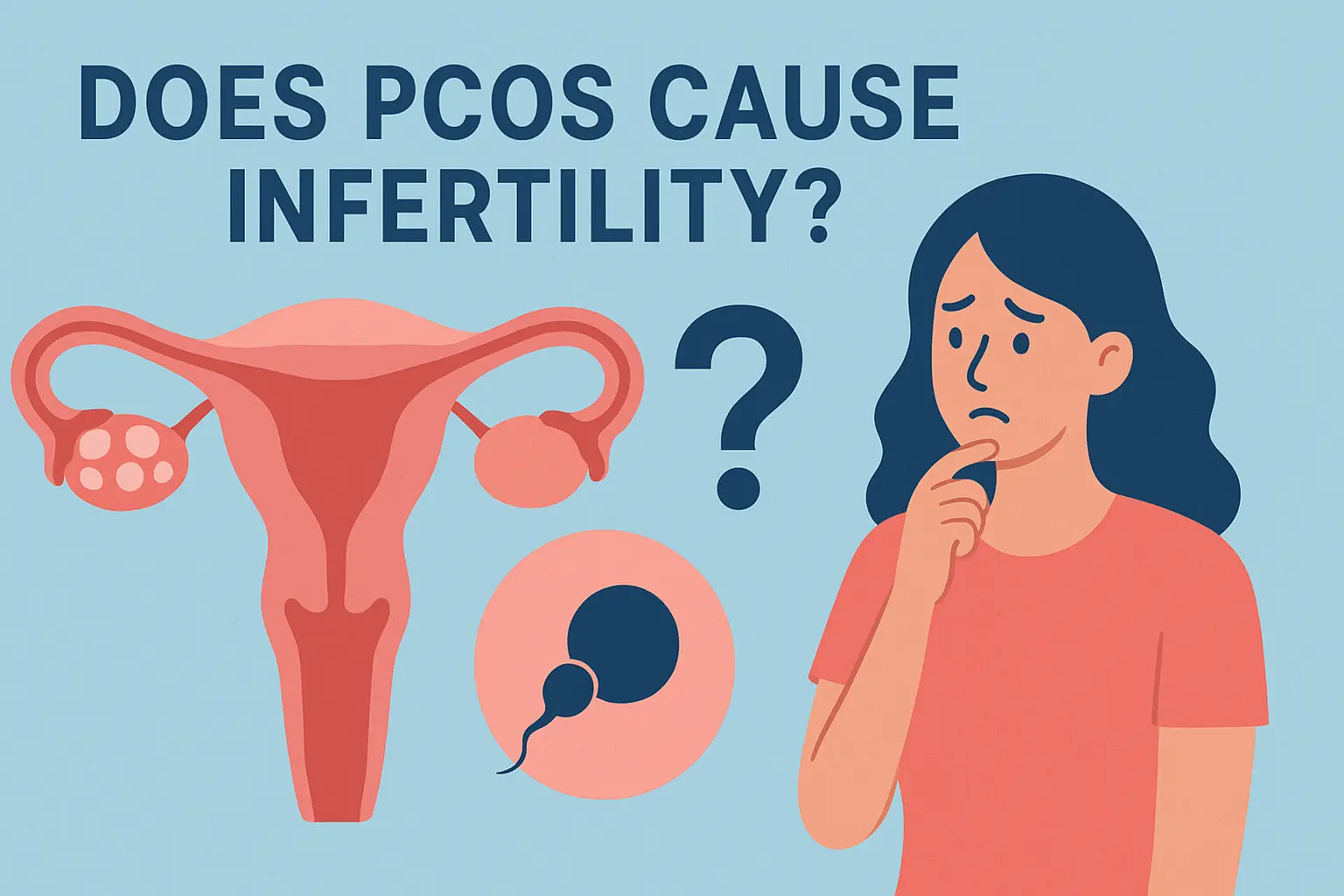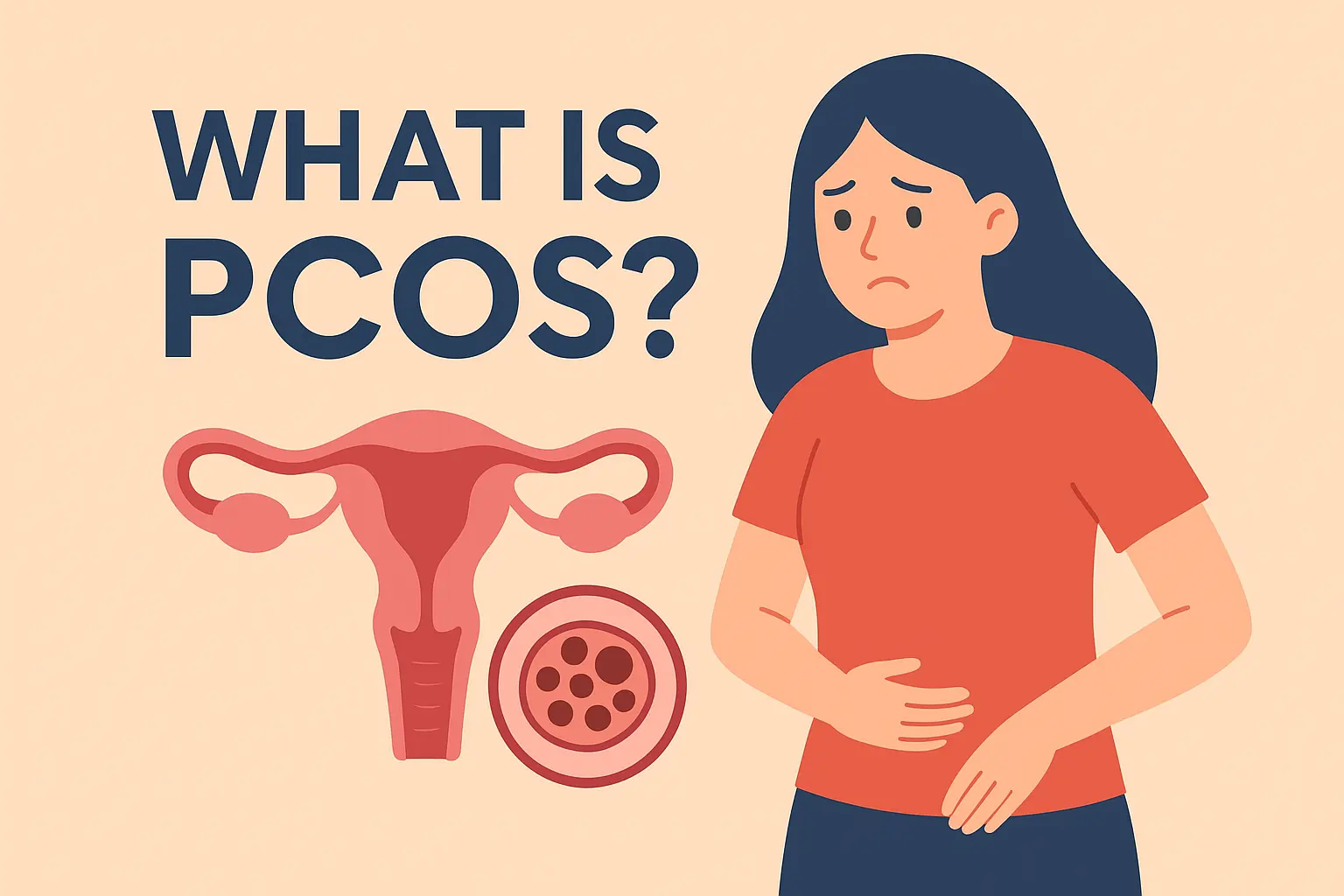Does PCOS Cause Infertility? A Complete Guide to Diagnosis and Treatment

PCOS is a common hormonal issue that affects women during their reproductive age. Usually starting from the adolescent period, symptoms of PCOS, including irregular periods, hormonal fluctuations, an increase in androgen levels, and even cysts in the ovaries, may vary with time. Many women often wonder, “Does PCOS cause infertility?” as the condition can sometimes interfere with regular ovulation and reproductive health.
In women with PCOS, the ovaries do not release eggs regularly, causing difficulty in conceiving. Even though they can get pregnant with proper medical support, it has been identified as one of the leading causes of infertility in women.
In this blog, we will discuss everything you need to know about PCOS and infertility, including the treatment options and ways to improve fertility.
What is PCOS?

Polycystic Ovary Syndrome, or PCOS, is a common hormonal condition in women where the ovaries are not released timely manner. Affecting approximately 5-10% of young women, PCOS often leads to difficulty getting pregnant or even infertility.
The hormonal imbalances caused by the condition can lead to a number of symptoms that can affect overall well-being. It includes irregular or absence of ovulation due to an excess of androgens and a disruption in the luteinizing hormone and follicle-stimulating hormone signals that regulate ovulation.
It can sometimes even cause insulin resistance. The key hormones affected by PCOS are androgens like testosterone, insulin, and reproductive hormones, like LH and FSH. Estrogen and progesterone levels are also disturbed by PCOS.
How PCOS Affects Fertility
PCOS disrupts the ovulation cycle by causing hormonal imbalances. This can lead to irregular or absent menstruation, making it difficult to conceive naturally. Identified as a leading cause of infertility, women with PCOS can still get pregnant through lifestyle changes or medical treatments.
- PCOS causes high levels of androgens, which affect the release of an egg from the ovary each month. This can cause anovulation (irregular or missed periods).
- Hormonal imbalance can sometimes lead to the retrieval of eggs in the immature phase, which are less likely to be fertilized.
- The irregular or absent periods make it difficult to plan conception.
- The condition can also cause an irregular shedding of the uterine lining, which can hinder the successful implantation of a fertilized egg.
- Many women with PCOS have also been identified with insulin resistance, leading to higher levels of insulin and hormonal imbalance.
- Women with PCOS have a higher chance of developing gestational diabetes.
- PCOS affects pregnancy, increasing the chance of early miscarriage, premature delivery, or cesarean delivery.
Common Symptoms Linked to Infertility
Different women may have different symptoms, based on their age, body type, genetics, and even lifestyle. Some women might have a few mild symptoms, while others may have severe symptoms. Some of the common symptoms include:
- Irregular or absent period (anovulation).
- Difficulty conceiving.
- Low sex drive.
- Hyperandrogenism or higher levels of androgen.
- Dysfunctional ovulation cycle.
- Polycystic ovaries with larger than normal size that haven’t matured properly.
- Hormonal imbalance and insulin resistance.
- Increased chance of miscarriage, cesarean delivery, or even premature delivery.
How Hormonal Imbalance Affects Reproductive Function?
Hormonal imbalances affect the menstrual cycle and ovulation, thereby disrupting the reproductive functions. This, in turn, leads to anovulation and hinders the uterine lining development, making it unfit for implantation.
Hormonal imbalances, say high levels of androgens, can prevent the eggs from maturing or even being released. The low levels of estrogen and progesterone can cause thinning of the uterine lining.
The imbalances can cause the release of poor-quality eggs, which reduces the chances of successful fertilization. Hormonal imbalances during pregnancy can increase the risk of miscarriage, gestational diabetes, and even high blood pressure.
Can You Get Pregnant with PCOS?
The answer is yes, you can get pregnant while having PCOS. However, it requires proper management of the symptoms, or sometimes medical assistance. PCOS makes conception more difficult, as ovulation is irregular. Around 22% of women with PCOS can get pregnant with ovulation-inducing medicines like clomiphene citrate.
Without the help of medications and treatments, almost 70-80% of women with PCOS are infertile, while around 30% may have the ability to conceive on their own. Other than the medications, maintaining a healthy weight, adopting a better lifestyle with a healthy diet and regular exercise, etc., can contribute to fertility in women with PCOS.
Treatment Options for PCOS-Related Infertility
A holistic and comprehensive approach while treating PCOS-induced infertility is crucial. This eliminates missing any chance to treat, prevent, and optimize health, to avoid any future complications.
The treatment options can be divided into non-pharmacological and pharmacological. Both these methods are not mutually exclusive, but rather indispensable and interdependent.
Non-Pharmacological Treatment Measures
Treating PCOS without medicines includes:
- Lifestyle modifications like exercise, dietary regulations, etc..
- Behavioral therapy for symptoms of depression related to body image or inability to conceive.
Pharmacological Treatments
The major treatments used for PCOS-related infertility are:
- Oral ovulation-inducing agents like clomiphene citrate and letrozole.
- Insulin sensitizers like Metformin.
- Gonadotrophins.
- Laparoscopic Ovarian Drilling.
- Assisted Reproductive Technologies, like in vitro fertilization, in vitro maturation, intracytoplasmic sperm injection, etc.
Natural Ways to Boost Fertility in PCOS
To naturally boost fertility in PCOS, a combination of strategies, including dietary changes, regular exercise, maintaining a healthy weight, and managing stress, is crucial.
- Consume food items with a low glycemic index, such as whole grains, legumes, and non-starchy vegetables. Avoid refined carbohydrates and sugary foods/drinks like soda and packaged juices.
- Include food with lean proteins and healthy fats such as fatty fish, avocados, nuts, seeds, and olive oils. Trans fats and processed meats should be limited.
- Increase the fiber intake, as fiber helps in digestion and removing excess hormones.
- Consume food with anti-inflammatory agents like turmeric, ginger, berries, and leafy greens.
- Maintain a healthy weight through regular exercise and a balanced diet.
- Get quality sleep for 7-9 hours per night to manage cortisol and reproductive hormone levels.
- Manage stress through mindfulness meditation, yoga, deep breathing, or even journaling.
- Consume supplements that support fertility, such as inositol, vitamin D, omega-3 fatty acids, folic acid, and even cinnamon.
Does PCOS Cause Infertility: Wrapping Up
PCOS patients trying to conceive should primarily make modifications in their lifestyle, alongside treatments like clomiphene tablets, IVF, IVM, etc., to minimize the effects of infertility. While there is no permanent cure for PCOS, getting proper, timely treatment can reduce the risk of complications during pregnancy. Therefore, understanding the answer to the question “Dose PCOS cause infertility” highlights the importance of early diagnosis and consistent management to improve reproductive outcomes.
Frequently Asked Questions
Yes, you can get pregnant with PCOS through proper care and treatment and maintaining a healthy lifestyle.
PCOS-induced infertility is very common, affecting around 70% of women with the condition.
The peak fertility in women with PCOS is considered to be between the 20s and early 30s.
If left untreated, PCOS can cause serious long-term health impacts, including type 2 diabetes, heart problems, high blood pressure, and obesity.
PCOS is caused by a number of factors, including genetics, resistance to insulin, and lifestyle.
